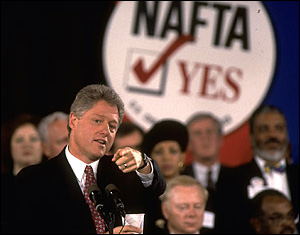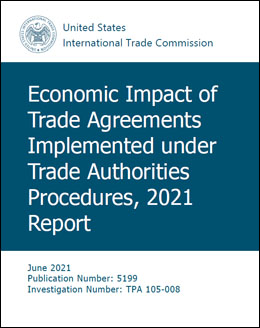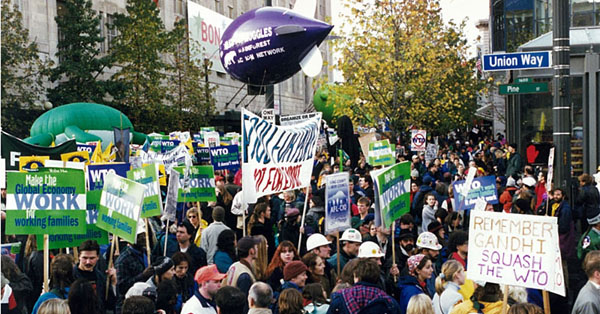OPINION
‘Free trade’ died this week – with a whimper
New ITC assessment of 40 years of trade deals: They didn’t help much.
Our assessment: Their economic and political consequences are incalculable.
By DAVID GROVES
 (July 1, 2021) — NAFTA. CAFTA. WTO. FTAA. TPP.
(July 1, 2021) — NAFTA. CAFTA. WTO. FTAA. TPP.
If you are a labor or environmental activist, those acronyms conjure up decades of pitched battles with lawmakers of both parties over so-called “free trade” agreements. Do they create millions of jobs and benefit the U.S. economy, as promised by Republican and Democratic presidents alike? Or do they kill jobs by making it easier to offshore them to low-wage countries and harm the environment by shifting production to nations with weak protections for our planet?
The debate has been especially divisive here in Washington, regularly touted as The Most Trade-Dependent State in the Nation™, as pundits and politicians have continually conflated principled opposition to free trade agreements with ignorant, self-defeating protectionism. Over the years, it has caused significant rifts between the state’s labor movement and its Democratic members of Congress.
Today, the president’s Trade Promotion Authority (TPA) expires. Trade deals can no longer be negotiated in the White House and submitted to Congress for a straight up-or-down vote without amendment.
In anticipation of a debate on whether to renew that authorization — previously known as “fast track” and long opposed by unions for helping to ram these trade deals through — Congress commissioned the U.S. International Trade Commission to study nearly four decades of TPA-negotiated trade deals. They wanted an answer: Have these deals actually boosted U.S. jobs and the economy?
 This week, the ITC report was very quietly released. The answer? Not much, if at all.
This week, the ITC report was very quietly released. The answer? Not much, if at all.
The ITC report concluded that TPA-negotiated trade deals have had a “small, positive effect” on U.S. economic growth and employment, but that these slight benefits “were not distributed evenly, with the biggest gains estimated for college-educated male workers.” The report found that 40 years of these trade pacts had increased U.S. economic output by $88.8 billion, or just 0.5 percent of the nearly $23 trillion U.S. economy, and they boosted overall U.S. employment by 485,000 full-time equivalent jobs or just 0.3 percent.
But importantly, as Politico reports, one big free trade deal outside the ITC report’s scope was the agreement struck by the United States to pave the way for China to enter the World Trade Organization in 2001. That deal has been blamed for the loss of about 5 million U.S. manufacturing jobs over the following decade, a phenomenon known as the “China shock.”
So in the aggregate, free trade policies have likely cost the U.S. millions of jobs with negligible economic benefit, just as organized labor has argued all along.
In the short term, it means TPA negotiation authority will be allowed to lapse and the Biden administration will not be incentivized to negotiate new trade deals, unless they are capable of serious Congressional scrutiny.

World Trade Organization protests in Seattle in 1999.
But the long-term economic and political consequences are incalculable. Free trade deals have accelerated the loss of America’s manufacturing base, jeopardizing our nation’s readiness to deal with everything from a major military conflict to a global pandemic. Plant closures due to offshoring have devastated communities throughout the nation, particularly in the Rust Belt states that handed Donald Trump the presidency. Democratic candidates have struggled to regain the confidence of the working-class voters who were once their base, but could see with their own eyes that the promises of free trade were a lie.
As trade deals’ benefits flowed mainly to corporations and white-collar workers, their consequences were borne by the working class, yet another reason for the chasm of wage and wealth inequality that is tearing at the seams of this country.
Anyone really paying attention has known for some time now that — as local trade guru Stan Sorscher likes to say — the old free trade approach is exhausted socially, politically, and economically.
Now it’s official. Free trade died this week—with a whimper. Good riddance.
David Groves is Editor of The Stand.





